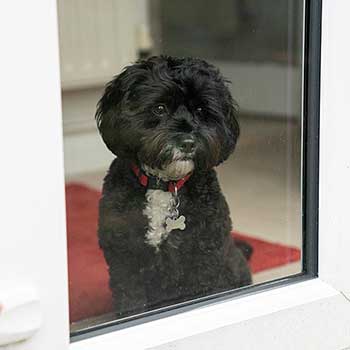- Find a Pet
- Advice and Welfare
- Ways to Give
- Get Involved
- What We Do
- Search
- My RSPCA
- Report a concern
- Gift in Wills
-
Colour modeVivid Calm
- Home
- Advice and welfare
- Pets
- Dogs
- #DogKind
Be #DogKind
For many of us, our dogs are at the centre of our universe, and so changes in our dog's behaviour can be concerning for us as owners. Of course changes in our own actions and behaviour might also have an impact on our four-legged friends.

Dogs are sensitive animals and as individual as we are. Dogs try to fit in with us as best they can, so even small changes in our interaction with them or their environment and/or routine can affect their behaviour.
So how best can we support our dog and where should we go for information and advice when we notice changes in our dog's behaviour?
We're pleased to say that from separation-related behavioural issues through to toilet training and barking concerns, #Dogkind is here to help you navigate the ups, down's and in-betweens of caring for your dog.
Developed by dog behaviour experts and based on evidence-based research, our #DogKind campaign provides expert hints, tips and practical advice to help you better understand your dog's behaviour.
Discover how to make your dog the happiest dog on the block...
Is my dog struggling with being left alone?
You love your dog and would do anything to make them happy. To your dog, you're their world and when you're away from them, they can find it incredibly difficult.
Many dogs simply don't know how to cope when their owner isn't at home. This is called separation-related anxiety. Some dogs will make their feelings known through barking, toileting indoors or destroying things. While others will simply sit there quietly, feeling very worried, which can easily go unnoticed.
Research suggests that eight out of 10 dogs find it hard to cope when left alone, and worryingly half won't show any obvious signs, which means you may not always know if there's a problem.
There are several reasons that dogs find it difficult to cope when left alone. Some dogs will simply be looking for ways to entertain themselves, while many will be very distressed when separated from their owner. Dogs are social animals and it is normal for them to want to be near us.
Separation-related behaviour can be displayed in many ways, but as it usually only occurs when the carer is out and stops when they return, it often goes unnoticed. Especially when your dog may seem completely happy when you come home.
If you're unsure whether your dog is struggling to be left alone, we've put together signs that can help you to identify how your dog is feeling when you can't see them.

What should I do if my dog is struggling to be left alone?
If your dog is one of the eight out of 10 dogs suffering from separation-related anxiety, they're likely to be feeling distressed.
Thankfully, there are ways you can help your dog feel safe and more relaxed (and prevent them from becoming distressed) when they're alone. From leaving a 'special' toy, to using a dog sitting service there are steps you can take to treat separation-related anxiety and the problem associated behaviour today.
How can I help my puppy or dog to ok when left alone?
Dogs who haven't learned to cope with being alone can find it incredibly hard when their owner isn't there. Learning to cope when alone is an essential part of any puppy or dog's life skills, and is the best way to prevent your dog from experiencing anxiety, stress or boredom in your absence.
Be #DogKind and share the campaign
Help us raise awareness for the dogs who are struggling to cope when left at home alone by sharing our campaign on social media.






